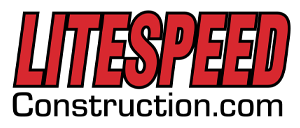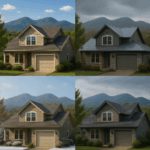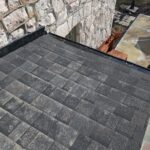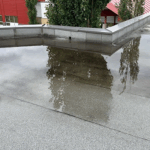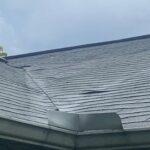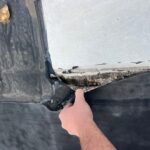What Is Included In A Commercial Roof Inspection?
A commercial roof inspection is a critical preventative maintenance step for property owners.
Whether you own or manage a commercial building in Asheville, NC, a roof inspection helps ensure that the roof stays in top condition, protecting your investment and avoiding unexpected repair costs.
For commercial properties, this process is far more comprehensive than a residential inspection, involving multiple steps to check for potential hazards, structural weaknesses, and signs of damage that could escalate if left unchecked.
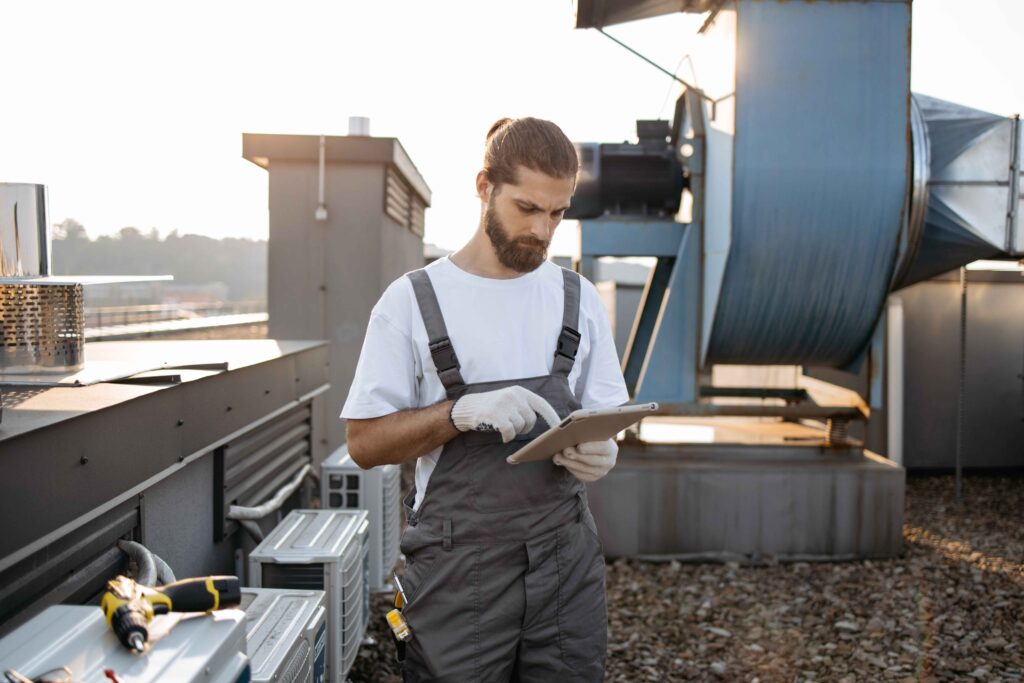
Commercial Roof Inspections Are Essential
A commercial roof inspection does more than provide peace of mind. With regular inspections, companies can identify minor issues early on, which can prevent expensive repairs or replacements. Statistics from the National Roofing Contractors Association (NRCA) reveal that up to 30% of commercial roofs require repairs within the first five years due to weather damage and other environmental stressors. Early intervention is key, as the cost of proactive maintenance is typically 50-70% lower than emergency repairs after severe damage.
Key Components of a Commercial Roof Inspection
A comprehensive commercial roof inspection should include the following areas of assessment:
1. Exterior Structural Assessment
Signs of Weathering: Asheville’s unique climate—ranging from heavy rainfall to sun exposure and occasional snow—can affect roofing materials. Inspectors check for discoloration, cracks, and other indications of weather-related wear.
Flashing: Flashing, which seals joints and prevents water entry, is a crucial point in commercial roof inspection. Deteriorated or missing flashing can result in water leaks, a common cause of structural damage in commercial properties.
2. Interior Structural Inspection
Ceiling and Attic: Commercial roofing inspectors look for water stains, mold, and mildew on ceilings and walls inside the property, as these can indicate leaks from the roof.
Insulation Check: Proper insulation is vital for energy efficiency. An inspector will evaluate insulation for any signs of moisture, which could lead to mold growth and affect indoor air quality.
3. Membrane Inspection
Rips, Tears, and Blistering: The roof membrane serves as a primary defense against moisture. Commonly found issues include punctures, blisters, and tears, especially in high-traffic areas or near roof-mounted equipment.
Adhesion: Inspectors ensure the membrane is properly adhered to the substrate. Poor adhesion can compromise roof stability and lead to leaks and other damage over time.
4. Drainage System Analysis
Gutters and Downspouts: Clogged or damaged gutters can lead to water pooling on the roof. Inspectors check for debris accumulation, rust, or other signs of wear.
Scuppers and Drains: These components direct water off the roof. Blocked or damaged drains can cause significant issues in heavy rains, a common weather event in Asheville’s mountain climate.
5. Roofing Material and Surface Condition
Material-Specific Wear: Whether the roof is metal, asphalt, or a green roofing system, inspectors evaluate material-specific signs of wear. Metal roofs, for example, are inspected for corrosion, while green roofs require checks for soil erosion and plant health.
UV and Thermal Impact: Exposure to UV rays can cause materials to weaken over time. Inspectors assess the degree of damage and, if necessary, recommend UV-resistant coatings to protect against future wear.
6. Mechanical Equipment and Rooftop Installations
HVAC and Solar Panels: Roof-mounted HVAC units, solar panels, and other installations can contribute to roofing issues if improperly installed or maintained.
Anchors and Supports: Inspectors look for signs of corrosion, loose components, and poor sealing around mounts and connections, all of which can lead to leaks or structural damage.
Common Repairs and Associated Costs
To give property owners a clearer picture of the types of repairs a commercial roof might need, here’s a breakdown of common issues, repair descriptions, and average costs. Note that prices vary based on roof size, material, and the extent of the damage.
| Repair Type | Description | Average Cost (USD) |
|---|---|---|
| Flashing Replacement | Replacement of worn or missing flashing to prevent leaks at joints. | $300 - $1,500 |
| Membrane Repair | Fixes rips, tears, or punctures in the roofing membrane. | $500 - $2,500 |
| Gutter and Drainage Repair | Cleaning and repairing gutters, drains, and downspouts to prevent water accumulation. | $250 - $1,200 |
| Roof Coating Application | Adding a reflective or UV-protective coating to extend roof life. | $0.75 - $2.50 per sq ft |
| HVAC Unit Flashing Repair | Repairing or replacing flashing around rooftop HVAC systems to prevent leaks. | $500 - $2,000 |
| Insulation Replacement | Removing damaged insulation and replacing with new material to improve energy efficiency. | $1.50 - $4.50 per sq ft |
| Leak Patch and Waterproofing | Sealing leaks with waterproof membranes and patches. | $500 - $3,000 |
| onding Water Solution | Installation of drains or sloping to reduce water pooling. | $1,000 - $5,000 |
Benefits of Routine Commercial Roof Inspections
Cost Savings
According to the U.S. Department of Energy, commercial properties can save an average of 15-20% on energy costs by maintaining insulation and roof coatings in good condition. Moreover, regular inspections prevent major structural repairs, saving potentially thousands of dollars.
Increased Longevity
Proactive maintenance and inspections can add 5-10 years to a roof’s life expectancy, depending on the roofing material. For a typical commercial roof in Asheville, this could mean delaying a replacement from 20 years to 30 years, depending on weather exposure and material quality.
Enhanced Safety
A well-maintained roof minimizes the risk of structural hazards. Loose materials or deteriorated components can pose risks to building occupants and visitors. For large facilities, this factor is particularly crucial to comply with OSHA regulations and state building codes.
FAQs About Commercial Roof Inspections
Ideally, commercial roofs should be inspected twice a year and after any severe weather events.
A standard inspection costs between $200 and $600, depending on the roof size and location.
Yes, regular inspections identify weak points that, if left unchecked, could lead to leaks.
Typically, maintenance costs, including inspections, can be deducted as business expenses. Consult a tax professional.
Depending on the size of the property, it can take anywhere from 1 to 4 hours.
Many companies offer thermal imaging to detect moisture under the surface.
While possible, a professional inspector is trained to detect subtle signs of damage.
Early spring and late fall are ideal to assess any seasonal damage.
Many warranties require regular inspections for coverage; check with your warranty provider.
Experienced inspectors can provide estimates on lifespan based on the current condition and type of roof.
